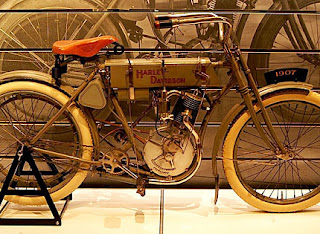 |
| Harley-Davidson logo |
Brand building. It’s the backbone of any
company or person. It’s how consumers identify with you. Know you. Want you.
Need you. What does this have to do with Harley-Davidson? Plenty.
Recently, hubby and I watched a three-part
movie about how the Harley-Davidson company was born on the Discovery channel. Boy did
I learn a lot about running a business and branding just by watching that
movie! The story focused on three partners: William (Bill)
Harley
(the engineer/creator), Arthur Davidson (the
salesman/marketer), and Walter Davidson (the risk-taker,
promoter). Together, these entrepreneurs gave the world of motorcycling an
experience that felt like ‘an explosion
between your legs’. Bill Harley’s words, not mine! LOL!
Here
are six things I learned from Harley-Davidson…
Create
buzz.
To build excitement and promote their product (think about this in terms of your
book/books) Harley-Davidson sponsored a racing team named ‘The Wrecking Crew’
whose seat-in-their-pants racing style got the press the company needed to get
on the map and stimulate sales. Okay, writers don’t need a Wrecking Crew. But
what about a Street Team, or a legion of super fans waiting in the wings for
your next book? Use your website, blog or email list to create the buzz your
book(s) need to get them flying off the shelves.
 |
| 1907 Harley-Davidson |
Find
your tribe.
Arthur Davidson worked hard to generate sales. He started bike clubs, opened
free beer tents at events to loyal customers, and had special offers/incentives
to returning buyers. He was a trail-blazer of social media one hundred years
before social media was even born. He engaged first, then sold. That’s what
writers should be doing on social media—connect and engage with their target
market first. If they trust you enough, they’ll ask about your book.
Look
outside of the box.
Always looking for ways to market his motorcycles, Arthur Davidson approached
the U.S. Postal Service and convinced them to trade their bicycles for
Harley-Davidsons. He followed through with the Fire and Police Departments and eventually
won them over. When the three partners met with the military during WW1, Arthur
suggested that they send mechanics (for FREE) to teach the soldiers how to fix
their motorbikes in case they broke down while they were overseas. This
strategy worked, and they shared the contract 50/50 with Indian Motorcycle, the number one
motorcycle company at the time. BTW—Indian went bankrupt in 1953. Writers need
to look outside the box too. There’s plenty of opportunity around, even if you
have to offer your first book (or a short story) for free.
Focus
on those little extras. Walter Davidson recognize the allure of the
motorcycle look and culture, so he launched a campaign to sell Harley-Davidson
accessories and clothing which remains a major part of the company’s success to
this day. Writers can open a ‘store page’ on their website (you have a website,
right?) and sell items that are connected to their books, like T-shirts, coffee
mugs or water bottles imprinted with their book cover, or even jewelry.
Re-brand
or face-lift when the unexpected happens. The stock market crash of 1929 hit
Harley-Davidson hard. There was no disposable income, and barely any sales. Bill
Harley decided to give his motorcycles a much needed face-lift during the
Depression. He redesigned their block-letter logo, and added a stylized eagle.
The company also started offering their motorbikes in an array of different
color schemes too. So when book sales are down, this gives writers an
opportunity to redesign their book covers, or pull books off the virtual
shelves and re-edit them. After all, Harley-Davidson built their company on a
quality product, so shouldn’t you?
Continue
to develop.
By the late 1930s, Bill Harley developed a new model that ended up being a
breakthrough for the company. Sales soared with this bigger, badder, and more
powerful machine. By the time WW2 began, Harley-Davidson had gained the respect
of the military, and were asked to ship over 90,000 military-style motorbikes overseas
to be used by the Allies. When the war ended, people returned to motorcycle
riding with a deep respect and trust for the Harley-Davidson brand. So, while you
may have one or more books out there for sale, it’s best to work on the next
one, and continue to develop your brand and author platform. You never know.
Your next book may be your ‘breakthrough’ book!
Is there a company out there that you’ve
learned some tricks and techniques from to help build your writing career? How
are you building your brand? Please leave a comment and share what you’ve
learned. Cheers for reading my blog, I truly appreciate it!

A great example. Others could be Ben & Jerry's Ice cream, Starbucks, Madonna and now Lady Gaga! AS writers we need to be reminded of these success stories. Thanks!
ReplyDeleteTrue that, Darlene! Examples of successful branding are everywhere. Success sure does leave clues! Cheers and thanks for commenting!
DeleteNice job, Sharon! Thanks for the suggestions.
ReplyDelete:)
You're welcome and thank you, Anne! Hope they help!
Delete